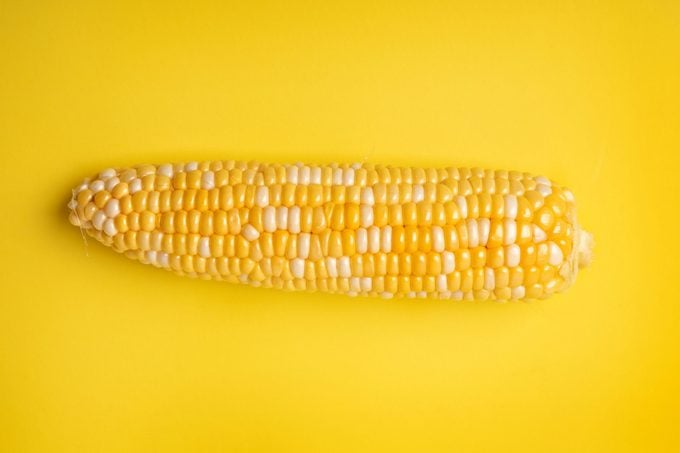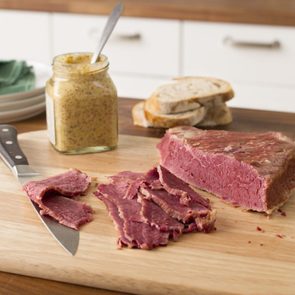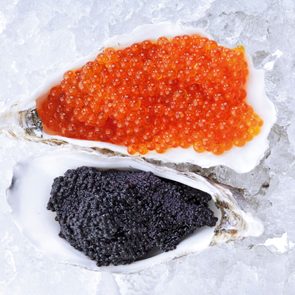Is Corn a Vegetable, a Grain or a Fruit?
Updated: Jul. 31, 2023

We think of this beloved American food as a vegetable, but could it really be a grain or fruit? The answer may surprise you.
Whether it’s fresh from the cob in the summer, creamed in the winter or turned into bread any time of year, we Americans love our corn. But just because millions of people love to eat it doesn’t mean they know what it is. Ask a group of people, “Is corn a vegetable, fruit or grain?” and you’ll be met with a bunch of blank stares, the same reaction you’d get if you asked whether tomatoes were fruits or vegetables or if peanuts were nuts.
And the debate around corn may be even more complicated than questions of whether eggplant is a fruit, cucumber is a fruit or avocado is a fruit. It falls into a few potential categories, confusing the issue. Is corn a vegetable? Is it a grain? Or wait, is corn a fruit? Here, discover all the food facts you need to know about this big lump of knobs.
Get Reader’s Digest’s Read Up newsletter for food info, humor, cleaning, travel, tech and fun facts all week long.
Is corn a vegetable?
Go ahead and ask a hundred people “Is corn a vegetable?” Something north of 90% of them will likely answer yes. And they would be correct! The United States Department of Agriculture (USDA) classifies corn as a vegetable—a starchy vegetable, to be precise. Other foods in this class include potatoes, jicama, plantains and yucca.
But whether corn is considered a vegetable actually comes down to when it is harvested.
The corn you picture when you think of it as a vegetable—the type you eat off the cob after you boil it or buy frozen to add the kernels to recipes—is fresh corn that was picked when the kernels were still soft and juicy. This version of corn is classified as a vegetable.
Is corn a grain?
Here’s where things start to get tricky. Not only is corn a vegetable, but it’s also a grain.
Fresh corn is a vegetable, but if you let the corn continue to mature and wait to harvest it until it’s dry, then it is considered a grain. Indeed, the same dietary guidelines from the USDA that classify corn as a vegetable classify popcorn, cornmeal and corn grits as grains. That’s because there’s a variety of corn that, when left to grow to maturity, becomes the kernels we know as popcorn, and another that is harvested at this mature stage and milled into cornmeal.
So when eaten in these forms, corn is a grain. In fact, popcorn and cornmeal are considered whole grains. Like wild rice, brown rice and quinoa, these good-for-you carbohydrates are consumed in their “whole” (unprocessed) form.
Is corn a fruit?

Is corn a vegetable? Yes. Is corn a grain? Also yes. So it can’t possibly be a fruit too, can it?
In a dietary sense, no—corn is not a fruit. But in a botanical sense, corn kernels are technically fruit (just as a pumpkin is technically a berry).
According to the Encyclopaedia Britannica, a fruit is “the fleshy or dry ripened ovary of a flowering plant, enclosing the seed or seeds.” This definition encompasses obvious fruits, such as apricots, bananas and grapes, as well as less-obvious ones, like tomatoes, cucumbers and, yes, corn kernels.
Of course, this definition has more to do with the physical and botanical nature of a corn plant. It doesn’t take into consideration how corn is classified from a dietary perspective.
So what, exactly, is corn?
Here’s the bottom line: When thinking about corn as we eat it, it is either a vegetable or a grain, depending on the form in which it is consumed. While it is botanically a fruit, you would not count corn toward your daily fruit intake. You would, however, count fresh corn as a serving of veggies and popcorn as a serving of whole grains.
Remember that the nutritional content of the veggie and grain is not the same, even though they’re both corn. The same goes for other corn-based products, including cornstarch, corn syrup, high-fructose corn syrup and maltodextrins. When it is transformed this far, the corn has become a processed food and is no longer a vegetable or a grain.
Sources:
- USDA: “Dietary Guidelines for Americans: 2020–2025”
- Whole Grains Council: “Whole Grains 101”
- Encyclopaedia Britannica: “Fruit”



















